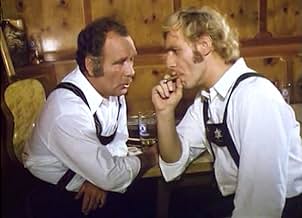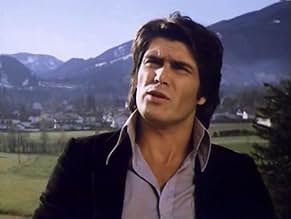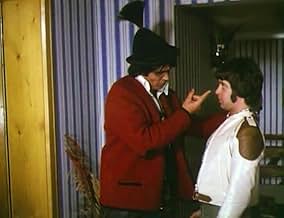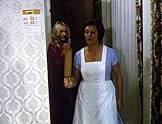Ajouter une intrigue dans votre langueThe call-boy, Alfredo, finally goes on a holiday in the Bavarian mountains. However, he has to deal with a lot of competitors.The call-boy, Alfredo, finally goes on a holiday in the Bavarian mountains. However, he has to deal with a lot of competitors.The call-boy, Alfredo, finally goes on a holiday in the Bavarian mountains. However, he has to deal with a lot of competitors.
Helga Bender
- Zenzi
- (as Helga König)
Flo Nordhoff
- Alter Mann
- (as Flo v. Nordhoff)
Melitta Tegeler
- Kommissar Anna Keller
- (as Melitta Tegler)
Histoire
Le saviez-vous
- ConnexionsFollowed by Laß jucken Kumpel 2. Teil: Das Bullenkloster (1973)
Commentaire à la une
Such was the assessment of "From the Lederhos'n with Love" (which would be the literal translation; "Lederhos'n" being traditional Bavarian short pants made of leather) by an established German film encyclopedia, no doubt written with a hint of sarcasm.
City-dwelling call-boy Alfredo (Peter Hamm) travels to the Bavarian countryside to take a break from his jarring job. But while trying to give his "moneymaker" some peace and quietness, he notices that most (female) tourists come to Sepps (Peter Steiner) hotel "The Wild Boar" in order to be 'serviced' by Sepp and the other sturdy village-studs. Seeing a business opportunity, Alfredo calls upon his partner-in-crime Tonio (Rinaldo Talamonti) and join Sepps competition at the hotel "The Tired Ox" (due to tourist-influx recently re-christened "The Fiery Bull"). While Afredo has to get to grips with his "battle-fatigue", leaving most of the work to Tonio, there are continuous fierce battles between the rivaling hotel-entrepreneurs.
The film is a strange little beast, which takes us back to the raunchier side of 1970s German cinema. After the conservative 60's with it's wave of harmless comedies and earthen 'Folk-movies', the market was rive for something naughtier – and by market we mean the seedy shoebox-cinemas that were generally located around the train-stations or red-light-districts. Suddenly this market was flooded with likewise erotic Blue-Movie-comedies, all produced on a shoestring-budget, all following the same formula: The humor had to be simple and raunchy, plenty of nudity was required, yet nothing that would cross the line into pornography (whereby we must consider: there's generally more nudity in a German shampoo-commercial than you would find in your typical American 'Erotic-Thriller').
Veteran of this genre was Franz Marischka, who not only directed the "Liebesgrüße"-Franchise and numerous sequels, but also the "Lass jucken, Kumpel"-Series and a slough of similar-minded, light-hearted Naughties. Essentially they were all the same films, with the exception that "Liebesgrüße" took place in rural Bavaria, while "Lass jucken" were produced in the proletarian, working-class Ruhrpott.
There isn't much of a story to speak off: Generally tourists take their holidays come to the countryside, which generally seems to have become stuck in the 18th century (not much has changed there until this day). The tourists are all naïve city-dwellers, who seem to know nature only from postcards and the locals are down-to-earth countryside-bumpkins that know the modern world only from hear-say. Both locals and visitors have only one thing in common: The guys are all horny and the girls are all willing. In other words: it's a cultural clash that usually ends in bed (or at least a barnyard, stable or wood-cabin).
What sets "Liebesgrüße aus der Lederhos'n" (like many other Marischka-productions) apart from most other raunchy comedies of the time, is the cast. Despite 90 percent of the actors coming from the obvious background, there would always be names that were already established (or would soon be) in the mainstream. In this case it's Peter Steiner, who would go on to be one of the best known and loved theater-actors in Bavaria (you would be hard-pressed to find a Bavarian granny who doesn't know the name Steiner) or Bavarian TV-regulars Elfie Pertramer and Franz Muxeneder. Needless to say, the "Lederhos'n"-films not only became commercially successful but also increased the tourism influx in Bavaria.
In other words, imagine a mix of a Russ Myers flick with the physical slapstick-humor of, say, "Police Academy", mixed with plenty of Bavarian countryside. I'd give it a 6/10 (within the genre confinement, of course).
City-dwelling call-boy Alfredo (Peter Hamm) travels to the Bavarian countryside to take a break from his jarring job. But while trying to give his "moneymaker" some peace and quietness, he notices that most (female) tourists come to Sepps (Peter Steiner) hotel "The Wild Boar" in order to be 'serviced' by Sepp and the other sturdy village-studs. Seeing a business opportunity, Alfredo calls upon his partner-in-crime Tonio (Rinaldo Talamonti) and join Sepps competition at the hotel "The Tired Ox" (due to tourist-influx recently re-christened "The Fiery Bull"). While Afredo has to get to grips with his "battle-fatigue", leaving most of the work to Tonio, there are continuous fierce battles between the rivaling hotel-entrepreneurs.
The film is a strange little beast, which takes us back to the raunchier side of 1970s German cinema. After the conservative 60's with it's wave of harmless comedies and earthen 'Folk-movies', the market was rive for something naughtier – and by market we mean the seedy shoebox-cinemas that were generally located around the train-stations or red-light-districts. Suddenly this market was flooded with likewise erotic Blue-Movie-comedies, all produced on a shoestring-budget, all following the same formula: The humor had to be simple and raunchy, plenty of nudity was required, yet nothing that would cross the line into pornography (whereby we must consider: there's generally more nudity in a German shampoo-commercial than you would find in your typical American 'Erotic-Thriller').
Veteran of this genre was Franz Marischka, who not only directed the "Liebesgrüße"-Franchise and numerous sequels, but also the "Lass jucken, Kumpel"-Series and a slough of similar-minded, light-hearted Naughties. Essentially they were all the same films, with the exception that "Liebesgrüße" took place in rural Bavaria, while "Lass jucken" were produced in the proletarian, working-class Ruhrpott.
There isn't much of a story to speak off: Generally tourists take their holidays come to the countryside, which generally seems to have become stuck in the 18th century (not much has changed there until this day). The tourists are all naïve city-dwellers, who seem to know nature only from postcards and the locals are down-to-earth countryside-bumpkins that know the modern world only from hear-say. Both locals and visitors have only one thing in common: The guys are all horny and the girls are all willing. In other words: it's a cultural clash that usually ends in bed (or at least a barnyard, stable or wood-cabin).
What sets "Liebesgrüße aus der Lederhos'n" (like many other Marischka-productions) apart from most other raunchy comedies of the time, is the cast. Despite 90 percent of the actors coming from the obvious background, there would always be names that were already established (or would soon be) in the mainstream. In this case it's Peter Steiner, who would go on to be one of the best known and loved theater-actors in Bavaria (you would be hard-pressed to find a Bavarian granny who doesn't know the name Steiner) or Bavarian TV-regulars Elfie Pertramer and Franz Muxeneder. Needless to say, the "Lederhos'n"-films not only became commercially successful but also increased the tourism influx in Bavaria.
In other words, imagine a mix of a Russ Myers flick with the physical slapstick-humor of, say, "Police Academy", mixed with plenty of Bavarian countryside. I'd give it a 6/10 (within the genre confinement, of course).
- t_atzmueller
- 15 nov. 2014
- Permalien
Meilleurs choix
Connectez-vous pour évaluer et suivre la liste de favoris afin de recevoir des recommandations personnalisées
- How long is Liebesgrüße aus der Lederhos'n?Alimenté par Alexa
Détails
- Date de sortie
- Pays d’origine
- Langue
- Aussi connu sous le nom de
- Loving Greetings from the Lederhosen
- Sociétés de production
- Voir plus de crédits d'entreprise sur IMDbPro
- Durée1 heure 32 minutes
- Couleur
- Rapport de forme
- 1.37 : 1
Contribuer à cette page
Suggérer une modification ou ajouter du contenu manquant

Lacune principale
By what name was Liebesgrüße aus der Lederhos'n (1973) officially released in Canada in English?
Répondre
























